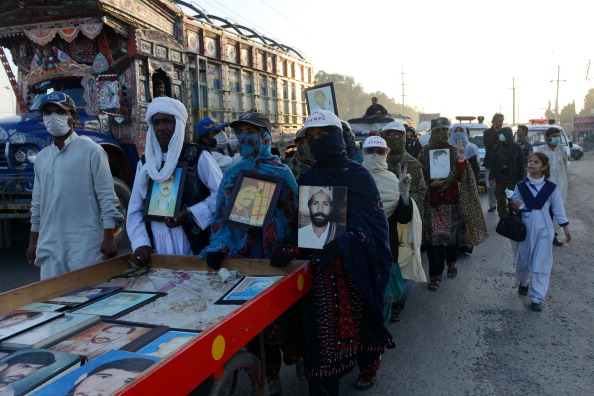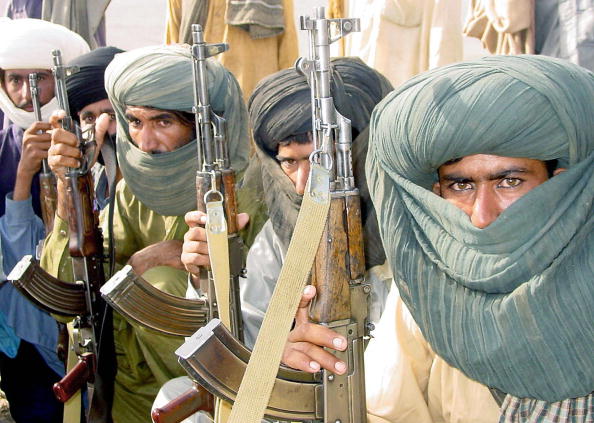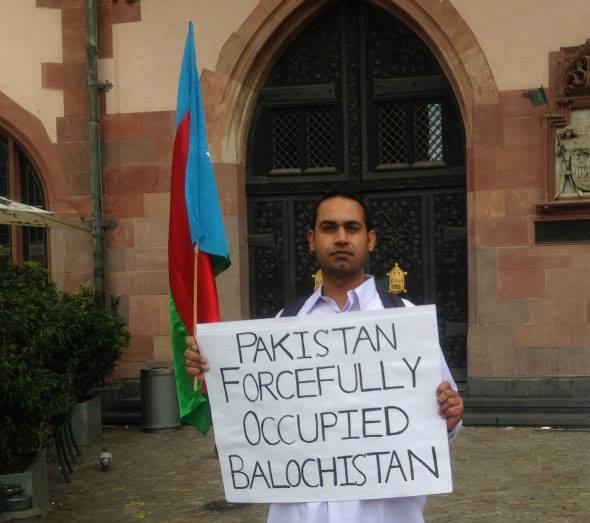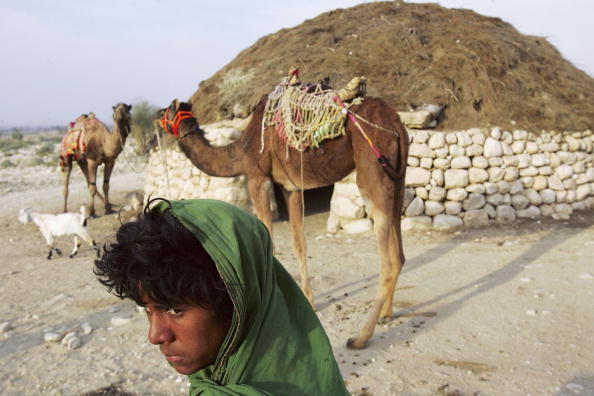Balochistan: 'Hundreds of people abducted and
murdered by Pakistan army' activists warn

Baloch activists are urging rights groups and the international community to pay
attention to the situation of people living in the Balochistan province, western Pakistan.
attention to the situation of people living in the Balochistan province, western Pakistan.
According to some members of the Baloch Republican Party (BRP) – a democratic
and secular organisation that aims to repel Pakistani occupation and regain sovereignty
in Balochistan –Balcoh people are persecuted, abducted and systematically killed by
Pakistani security agencies and the Pakistani Army.
and secular organisation that aims to repel Pakistani occupation and regain sovereignty
in Balochistan –Balcoh people are persecuted, abducted and systematically killed by
Pakistani security agencies and the Pakistani Army.
Ashraf Sherjan, president of the BRP Germany Chapter, has warned that Balochs are
haunted by what he calls "Pakistani kill-and-dump-policy intelligence agencies and
armed forces."
haunted by what he calls "Pakistani kill-and-dump-policy intelligence agencies and
armed forces."
Speaking to IBTimes UK, he said: "Since Balochistan was forcefully occupied by
Pakistan, Baloch people have been living as guests of death.
Pakistan, Baloch people have been living as guests of death.
"It has never been considered, even outside Pakistan, that Balochistan belongs to
the Baloch people who are now haunted. Baloch leaders are being deliberately
assassinated by the occupying state of Pakistan for demanding rights to their own
land."
the Baloch people who are now haunted. Baloch leaders are being deliberately
assassinated by the occupying state of Pakistan for demanding rights to their own
land."
Sherjan then cited the case of Baloch leader Shaheed Nawab Akbar Bugti, who
was attacked and killed along with his tribesmen in 2006.
was attacked and killed along with his tribesmen in 2006.
Balochistan historyBalochistan, a large area bordering with Afghanistan to the north and Iran and the Arabian Sea to the south, is inhabited mainly by Baloch, Pashtuns and Brahuis, and smaller communities and tribes such as Iranian Baloch, Hazaras, Marri and Bugti.Balochistan was invaded by Britain in 1839. As a result of the invasion hundreds of people, along with the then Baloch ruler Mir Mehrab Khan, died.Balochistan was then divided into three parts: Northern Balochistan and Western Balochistan were given to Persia and Afghanistan respectively, and Eastern Balochistan was under British rule until 1947.After the British left, Balochistan was annexed to Pakistan. According to some, the then ruler Khan of Kalat was forced to sign accession documents despite a previous document recognising the independence of the Baloch people which had been signed by the British, Balochistan and the upcoming Pakistan administration.Since then, separatist groups demanding independence have engaged in armed struggles with the Pakistani government.During an armed struggle erupted in 2004, Balochistan's leader Nawab Akbar Bugti was killed by the Pakistani government, which accused him of being a warlord and using the Balochistan Liberation Army as a facade to run his own militia.
His murder prompted unrest in the area with thousands of students from
Balochistan University and other locals rioting, sparking fears that the then
Pakistani President Pervez Musharraf would be targeted with attacks in retaliation.
Balochistan University and other locals rioting, sparking fears that the then
Pakistani President Pervez Musharraf would be targeted with attacks in retaliation.
"It would take days to mention the names of the thousands of Baloch political
activists, leaders and students who were killed," Sherjan said.
activists, leaders and students who were killed," Sherjan said.
Black month
Baloch activists refer to March as a "black month" for Balochistan history as in
two separate occasions during the month, Balochistan was first invaded and
then bombarded.
two separate occasions during the month, Balochistan was first invaded and
then bombarded.
"On 27 March 1948 Pakistan invaded Balochistan and coerced the Baloch ruler to
sign a so-called 'accession treaty' after the Baloch Parliament had rejected the
offer to join Pakistan on the basis of shared religion," Sherjan said.
sign a so-called 'accession treaty' after the Baloch Parliament had rejected the
offer to join Pakistan on the basis of shared religion," Sherjan said.
"On 17 March 2005, Pakistani paramilitary forces bombarded the entire city of
Dera Bugti. More than 70 people, the majority of whom were women and children,
were killed and nearly 200 were injured."
Dera Bugti. More than 70 people, the majority of whom were women and children,
were killed and nearly 200 were injured."

People abducted and killed
In 2011, Human Rights Watch released a report documenting rights abuses
committed by the Pakistani government against people in Balochistan.
committed by the Pakistani government against people in Balochistan.
The group urged Pakistan to end "widespread disappearances of suspected
militants and activists by the military, intelligence agencies, and the paramilitary
Frontier Corps in the south-western province of Balochistan".
militants and activists by the military, intelligence agencies, and the paramilitary
Frontier Corps in the south-western province of Balochistan".
The report detailed 45 alleged cases of enforced disappearances – the majority
occurred in 2009 and 2010 – and warned that some of the people who were
abducted were also executed.
occurred in 2009 and 2010 – and warned that some of the people who were
abducted were also executed.
According to Sherjan, the policy of abducting and killing Baloch people still
continues today.
continues today.
"Many bodies have been found with amputated limbs in various areas across
Balochistan and in Karachi. This inhumane practice continues to date and families
of enforced-disappeared Balochs report that more than 20,000 Balochs have
disappeared since current Pakistani President Pervez Musharraf took power in
1999," he said.
Balochistan and in Karachi. This inhumane practice continues to date and families
of enforced-disappeared Balochs report that more than 20,000 Balochs have
disappeared since current Pakistani President Pervez Musharraf took power in
1999," he said.

"In January 2014 three
Tootak area of Khuzdar
district in Balochistan.
The graves contained
at least 169 bodies.
Only three of the persons
have been identified as
previously abducted
persons who were
picked up from their
homes by Pakistani
paramilitary forces.
"The rest of the bodies
could not be identified
because they were
mutilated beyond recognition. The military quickly cut off all access to
the graves and took control of the remaining bodies so no further forensic
identification work was possible."
Sherjan also urged the Norway government and the international community
to shed light on the fate of Ehsan Arjemandi, a Norway national allegedly
abducted in 2009, while he was on his way to Karachi from Balochistan.
"He has not been heard from or seen in public since then. The Pakistani
intelligence service, the ISI, is believed to be responsible for the abduction.
I urge the human rights organisation including the European Union and United
Nations to take notice of Balochistan's situation and play their moral role in
ending human rights violations before it's too late."
intelligence service, the ISI, is believed to be responsible for the abduction.
I urge the human rights organisation including the European Union and United
Nations to take notice of Balochistan's situation and play their moral role in
ending human rights violations before it's too late."



No comments:
Post a Comment